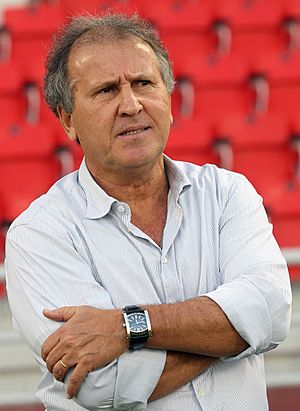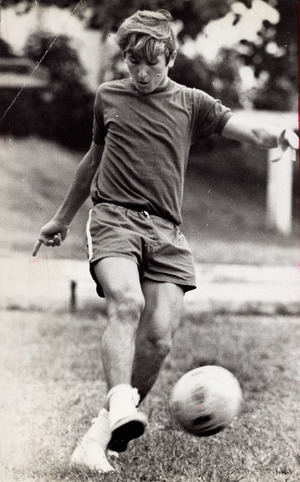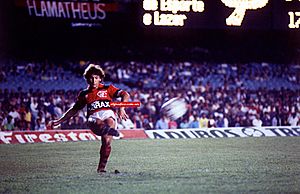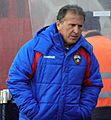Zico (footballer) facts for kids

Zico managing Iraq in 2012
|
||||||||||||||||||||||
| Personal information | ||||||||||||||||||||||
|---|---|---|---|---|---|---|---|---|---|---|---|---|---|---|---|---|---|---|---|---|---|---|
| Full name | Arthur Antunes Coimbra | |||||||||||||||||||||
| Date of birth | 3 March 1953 | |||||||||||||||||||||
| Place of birth | Rio de Janeiro, Brazil | |||||||||||||||||||||
| Height | 1.72 m (5 ft 8 in) | |||||||||||||||||||||
| Position(s) | Attacking midfielder | |||||||||||||||||||||
| Team information | ||||||||||||||||||||||
|
Current team
|
Kashima Antlers (technical adviser) | |||||||||||||||||||||
| Youth career | ||||||||||||||||||||||
| 1967–1971 | Flamengo | |||||||||||||||||||||
| Senior career* | ||||||||||||||||||||||
| Years | Team | Apps | (Gls) | |||||||||||||||||||
| 1971–1983 | Flamengo | 212 | (123) | |||||||||||||||||||
| 1983–1985 | Udinese | 39 | (22) | |||||||||||||||||||
| 1985–1989 | Flamengo | 37 | (12) | |||||||||||||||||||
| 1991–1994 | Kashima Antlers | 45 | (35) | |||||||||||||||||||
| Total | 333 | (192) | ||||||||||||||||||||
| International career | ||||||||||||||||||||||
| 1976–1986 | Brazil | 71 | (48) | |||||||||||||||||||
| Managerial career | ||||||||||||||||||||||
| 1999 | Kashima Antlers | |||||||||||||||||||||
| 2000–2002 | CFZ | |||||||||||||||||||||
| 2002–2006 | Japan | |||||||||||||||||||||
| 2006–2008 | Fenerbahçe | |||||||||||||||||||||
| 2008 | Bunyodkor | |||||||||||||||||||||
| 2009 | CSKA Moscow | |||||||||||||||||||||
| 2009–2010 | Olympiacos | |||||||||||||||||||||
| 2011–2012 | Iraq | |||||||||||||||||||||
| 2013–2014 | Al-Gharafa | |||||||||||||||||||||
| 2014–2016 | FC Goa | |||||||||||||||||||||
| 2018–2022 | Kashima Antlers (technical director) | |||||||||||||||||||||
| 2022– | Kashima Antlers (technical adviser) | |||||||||||||||||||||
|
Medal record
|
||||||||||||||||||||||
| *Club domestic league appearances and goals | ||||||||||||||||||||||
Arthur Antunes Coimbra (born March 3, 1953), known as Zico, is a famous Brazilian football coach and former player. He played as an attacking midfielder. Many people called him the "White Pelé" because he was a very creative player. Zico had amazing skills, great vision on the field, and scored many goals. He is known as one of the best players of all time.
Zico was arguably the best player in the world in the late 1970s and early 1980s. He was especially good at setting up plays and scoring from free kicks. He could bend the ball in incredible ways. It's believed that Zico scored more goals from direct free kicks than any other player.
In 1999, Zico was ranked seventh in the FIFA Player of the Century vote. In 2004, he was named in the FIFA 100 list of the greatest living players. Even Pelé said that Zico was the player who came closest to him. Zico was also named Player of the Year in 1981 and 1983.
Zico scored 48 goals in 71 official games for the Brazil national football team. This makes him the fifth highest goalscorer for his country. He played for Brazil in the 1978 FIFA World Cup, 1982 FIFA World Cup, and 1986 FIFA World Cup. Even though the 1982 team was one of Brazil's best ever, they did not win the tournament. Zico is often called the greatest Brazilian player never to win the World Cup.
After his playing career, Zico coached the Japan national football team. He led them in the 2006 FIFA World Cup and won the 2004 Asian Cup. He also coached Fenerbahçe, guiding them to the UEFA Champions League quarter-finals in 2007–08. He has also coached teams like CSKA Moscow, Olympiacos, and the Iraq national team. Today, he works as a technical adviser for Kashima Antlers.
Contents
Zico's Early Life
Zico was born in 1953 into a family of Portuguese background in Rio de Janeiro, Brazil. Like many Brazilian kids, he dreamed of becoming a professional footballer. He often skipped school to play football on the streets. His amazing skills made him famous in his neighborhood. People would gather to watch him play against older kids. At that time, he played for a local futsal team called Juventude. He also played for a futsal club called River Futebol Clube on Sundays.
His nickname, Zico, came from his family. His original name was Arthur, and they used to call him Arthurzinho (Little Arthur). This became Arthurzico, then Tuzico, and finally Zico.
In 1967, when he was 14, Zico was supposed to try out for America Football Club. His older brothers, Antunes and Edu, were professional players there. But one Sunday, during a River match, Zico scored nine goals. A radio reporter named Celso Garcia noticed him. The reporter asked Zico's father to take him to try out for Flamengo instead. Zico was a Flamengo fan, so his father agreed. This was the start of his journey to becoming a football legend.
Youth Football Career
Zico was not very strong physically when he was young. His journey to becoming a top athlete involved a lot of hard work. He followed a tough muscle and body development program. This, along with a special diet, helped him become a strong athlete. This physical development was very important for his future success.
Between 1971 and 1972, Zico moved between the youth and professional teams. Coach Fleitas Solich believed in Zico and promoted him. However, when a new coach, Zagallo, took over, Zico was sent back to the youth team. Zagallo thought Zico was too young. Things got better for Zico when Joubert, his first youth coach, became the senior team's coach. Joubert fully promoted Zico after he had played 116 matches and scored 81 goals for the youth team.
Club Football Career
Flamengo: A Golden Era (1971–1983)
At Flamengo, Zico was the most important player during the team's best years. During his first time at Flamengo, he helped the team win many titles. These included the 1981 Copa Libertadores, the 1981 Intercontinental Cup, and four national titles. Zico was amazing on the field. He scored goals in every possible way and was also a great passer and team organizer. He was known for his excellent vision of the field. Zico could use both feet to play and was a master at free kicks.
Udinese: An Italian Adventure (1983–1985)
After getting offers from big Italian clubs, Zico decided to move to Italy. He joined Udinese for a large amount of money. This transfer caused a big stir in Italy. Fans in Udine protested in the streets, shouting "Either Zico or Austria!" because they wanted him so badly. The deal eventually went through. Zico's arrival made Udinese fans dream of better days.
In his first season in Italy (1983–84), Zico played incredibly well. His free kicks were so powerful that TV shows debated how to stop them. He scored 19 goals, just one less than the top scorer, Michel Platini, even though Zico played fewer games due to an injury. He was also named the World Soccer Player of the Year in 1983.
His second season was tougher due to injuries. He also complained that the club wasn't signing enough good players, making the team too dependent on him. After a great final match against Diego Maradona's Napoli, Zico returned to Brazil and Flamengo. He is still loved by Udinese fans for his spectacular goals.
Back to Flamengo (1985–1989)
Soon after returning to Flamengo, Zico suffered a serious knee injury. This kept him out of the game for many months and even affected his performance in the 1986 FIFA World Cup. After recovering, Zico's career improved. In 1987, he led Flamengo to win the Copa União title.
In December 1989, Zico played his last official game for Flamengo. It was a Brazilian National Championship match against their rivals, Fluminense. Zico scored the first goal, and Flamengo won 5–0.
Two months later, at the Maracanã stadium, he played his very last match as a Flamengo player. He faced a team of World Cup legends. Zico played 731 matches for Flamengo, making him the player with the second most appearances for the club. His 508 goals make him the club's all-time top scorer.
Zico's achievements inspired the Brazilian singer Jorge Ben Jor to write a song about him. This helped create the special feeling around Flamengo's number 10 jersey.
A Short Break from Football
After his time at Flamengo, Zico played in the World Cup of Masters, scoring in the finals of the 1990 and 1991 tournaments.
After Brazil's first presidential election in many years, the new president appointed Zico as his Minister of Sports. Zico worked in this role for about a year. His most important work was creating a law about how sports teams do business.
Kashima Antlers: A New Chapter (1991–1994)
In 1991, Zico stopped his political work to join Sumitomo Metals in Japan. The team was in the second division, and Zico's job was to help them get into Japan's first professional football league, the J1 League, which started in 1993. Zico was the top scorer in the second division in 1991–92.
When the new J.League began, Zico scored three goals in the opening match for his team, now called Kashima Antlers. The Antlers were a small-town club, and no one expected them to compete with bigger teams. But Zico helped them win the J.League Suntory Series and finish second in their first season. This helped the club become one of the league's best. On June 15, 1994, he scored the final goal of his playing career.
His hard work and skill fit very well with Japanese culture. Japanese football fans called him the "God of Football." He became a local hero in Japan for building a strong team from almost nothing. A statue in his honor stands outside Kashima Soccer Stadium.
Zico's International Career
Zico's journey with the Brazil national football team almost ended early. He played his first international game in 1971, helping Brazil qualify for the 1972 Summer Olympics. Even though he scored the winning goal against Argentina, he was not chosen for the Olympic team. He felt very upset and told his father he wanted to stop playing football. He even missed training for 10 days at Flamengo before his brothers convinced him to keep playing.
In the 1978 World Cup, Zico scored a goal against Sweden in the last minute, which would have won the game. But the referee disallowed the goal, saying he had blown the whistle to end the match while the ball was still in the air. Later in the tournament, Zico scored a penalty in a 3–0 win over Peru. Brazil eventually won a bronze medal, finishing third.
Zico also won another bronze medal with Brazil in the 1979 Copa América, where he scored two goals.
The 1982 FIFA World Cup featured Zico as part of an amazing Brazilian team. This squad included other great players like Paulo Roberto Falcão, Sócrates, and Éder Aleixo. Zico scored 4 goals, and the team showed incredible skill. However, they were defeated 3–2 by Italy in a key match and were knocked out of the tournament.
In the 1986 FIFA World Cup, Zico played while still recovering from an injury. He only came on as a substitute. In the quarter-final against France, he helped Brazil win a penalty kick, but he missed it. The game ended in a tie and went to a penalty shootout. Zico scored his penalty in the shootout, but Brazil lost after other players missed their kicks.
In 1988, Zico was cleared of all tax charges in Italy. To thank the city of Udine, which had welcomed him so warmly, he played his farewell match for Brazil there in March 1989. Brazil lost 1–2 to a World All-Stars team.
Zico's Playing Style
Zico was a classic number 10, usually playing as an attacking midfielder. He could also play in other attacking roles. Many consider him one of the greatest footballers ever. He was a small but quick and creative player. Zico was known for his amazing technique, ball control, and dribbling skills. He often used tricks to get past opponents. Former Dutch player Ruud Gullit called Zico "one of the best dribblers in history."
Even though he wasn't physically big, Zico was a complete player with excellent vision. He is considered one of the best passers of all time, known for his special no-look passes. Besides creating goals, Zico was also a great goalscorer himself. He had a powerful and accurate shot, making him very effective in front of the goal.
He was also a master of set-pieces, especially free kicks. Zico could bend the ball and score from almost anywhere. His unique free-kick technique involved leaning back and kicking the ball with his instep. This allowed him to lift the ball high over the wall and make it drop into the net. His skill from free kicks inspired other famous players like Roberto Baggio and Andrea Pirlo.
Beyond his skills, Zico was known for his leadership and strong will. He was dedicated and had an amazing work ethic. He often stayed after training to practice his free kicks. Throughout his career, Zico was nicknamed O Galinho ("The Little Rooster").
Despite his great talent, Zico's career was often affected by injuries.
After Retirement
Zico officially retired from professional football in 1994. However, he was invited to play beach soccer. He won the Beach Soccer World Cup 1995, scoring 12 goals and being named the best player. He then returned to Kashima Antlers as a technical adviser in 1995. He split his time between Japan and Brazil, where he still played beach soccer. In 1996, he won his second Beach Soccer World Cup with Brazil. He also founded two football clubs in Brazil: CFZ in Rio de Janeiro and CFZ de Brasília in 1999.
Coaching Career
Coaching Japan
After the 2002 FIFA World Cup, the Japan Football Association chose Zico as the new coach. Even though he didn't have much coaching experience, Zico understood Japanese football well from his playing days. He wanted the team to play a free-flowing, attacking style.
His time as coach started a bit rough, including a 4–1 loss to Argentina in 2003. Japan struggled in early 2004, and some fans even demanded his firing. However, Zico stayed and led Japan to win the 2004 Asian Cup. He then helped Japan qualify for the 2006 FIFA World Cup with only one loss.
Despite a difficult start and injuries to key players, Zico led Japan to their third World Cup appearance and their third Asian Cup title. His Japanese team played with a style similar to Brazil's short passing game. He was flexible with formations, switching between 4-4-2 and 3-5-2. His team also had good results against European teams. However, Japan did not win any matches at the 2006 World Cup. Zico resigned as Japan's coach after the tournament.
Coaching Fenerbahçe
In July 2006, Zico signed a two-year deal to coach Fenerbahçe in Turkey. He won the league title in 2006–07 and the Turkish Super Cup in his first year. Under his leadership, Fenerbahçe reached the 2007–08 UEFA Champions League knockout stage for the first time in the club's history. They beat Sevilla on penalties to reach the quarter-finals. Fenerbahçe won the first game against Chelsea 2–1, but Chelsea won the second leg 2–0, eliminating Fenerbahçe. This was Fenerbahçe's best performance in UEFA competitions.
Fenerbahçe fans gave Zico a new nickname: Kral Arthur (King Arthur). On June 10, 2008, he resigned as Fenerbahçe manager because they couldn't agree on a new contract.
Coaching Bunyodkor, CSKA Moscow, and Olympiacos
In 2008, Zico coached FC Bunyodkor in Uzbekistan, where he won the Uzbekistani Cup and the Uzbek League. He then took over at Russian club CSKA Moscow but was fired on September 10, 2009.
Less than a week later, Zico signed a two-year contract with Olympiacos in Greece. Despite many players being injured, he led the Greek club to qualify for the knockout stage of the Champions League. His first results in the Greek Superleague were also impressive. However, after a Greek cup loss and a draw in the league, Zico was sacked on January 19, 2010.
Coaching Iraq
Zico signed a contract with the Iraq Football Federation on August 28, 2011. He coached the national team for the first time in a match against Jordan on September 2, 2011. Zico resigned as Iraq's coach on November 27, 2012. He stated that the country's football association had not kept their promises in his contract. He had 10 wins, 6 draws, and 5 losses in 21 games with Iraq.
Coaching Al-Gharafa
On August 6, 2013, Zico signed a two-year deal to coach Al-Gharafa in Qatar.
Coaching FC Goa
Indian Super League team FC Goa signed Zico as their coach for the first season in 2014. Goa started slowly but managed to reach the semifinals. In 2015, FC Goa did very well and reached the final, but they lost 3–2 to Chennaiyin FC. Zico became a legend among the local fans in Goa. In January 2017, FC Goa and Zico decided to end their three-year partnership.
Administrative Roles
Zico worked as a director at Kashima Antlers from 1996 to 2002.
On May 30, 2010, it was announced that Zico would become the new football director for Flamengo. He was returning to the team where he had won his most important titles after 25 years. However, this return lasted only five months, as he resigned due to disagreements with the club's board.
On June 10, 2015, Zico announced he would run for the FIFA presidency. This was after Sepp Blatter resigned due to corruption claims.
In August 2018, Zico returned to Kashima Antlers as a technical director. He continues to work as a technical adviser for the club as of July 2025.
Personal Life
Zico's grandfathers were both Portuguese. His father, José Antunes Coimbra, also Portuguese, came to Brazil when he was 10. Zico's mother, Matilde Ferreira da Silva Costa, passed away in 2002. Because of his family background, Zico also has Portuguese citizenship in addition to his Brazilian one.
Zico was the youngest of six children. His siblings are Maria José (Zezé), Antunes, Nando, Edu, and Antônio (Tonico).
In 1969, Zico met Sandra Carvalho de Sá, who would become his wife. They got engaged in 1970 and married in 1975. Sandra's sister, Sueli, is married to Zico's brother, Edu. Zico has three sons: Arthur Jr., Bruno, and Thiago. Zico is also a Roman Catholic.
Honours
Player
Club
- Flamengo
- Campeonato Carioca: 1972, 1974, 1978, 1979, 1979 (extra), 1981, 1986
- Campeonato Brasileiro Série A: 1980, 1982, 1983
- Copa União: 1987
- Copa Libertadores: 1981
- Intercontinental Cup: 1981
- Kashima Antlers
- J.League Suntory Series: 1993
International
- Brazil
- FIFA World Cup third place: 1978
- Copa América third place: 1979
- Taça do Atlântico: 1976
- Copa Río Branco: 1976
- Taça Oswaldo Cruz: 1976
- Bicentennial Cup: 1976
- Brazil U23
- CONMEBOL Pre-Olympic: 1971
Individual Awards
- Bola de Ouro: 1974, 1982
- Bola de Prata: 1974, 1975, 1977, 1982, 1987
- Campeonato Carioca top scorer: 1975, 1977, 1978, 1979, 1982
- South American Footballer of the Year: 1977, 1981, 1982
- Brazilian season top scorer: 1976, 1977, 1979, 1980, 1982
- FIFA XI: 1979, 1982
- Campeonato Brasileiro Série A top scorer: 1980, 1982
- Copa Libertadores Best Player: 1981
- Copa Libertadores top scorer: 1981
- Intercontinental Cup MVP Award: 1981
- FIFA World Cup Bronze Boot: 1982
- FIFA World Cup All-Star Team: 1982
- World Soccer Player of the Year: 1983
- Beach Soccer World Championship Top Scorer: 1995
- Beach Soccer World Championship Best Player: 1995
- FIFA Order of Merit: 1996
- FIFA 100: 2004
- Golden Foot Legends Award: 2006
- Brazilian Football Museum Hall of Fame: 2010
- Japan Football Hall of Fame: 2016
Records
- Top scorer in Flamengo's history – 508 goals
- Top scorer in Maracanã Stadium – 333 goals
- Japan Soccer League record for goals scored in straight matches – 11 goals in 10 matches (1992)
- Flamengo record holder – Top scorer in a single season – 81 goals (1979)
Manager
Club
- Fenerbahçe
- Süper Lig: 2006–07
- Turkish Super Cup: 2007
- Bunyodkor
- Uzbekistani Cup: 2008
- Uzbek League: 2008
- CSKA Moscow
- Russian Super Cup: 2009
- Russian Cup: 2008–09
International
- Japan
- Asian Cup: 2004
Images for kids
See also
 In Spanish: Zico para niños
In Spanish: Zico para niños




